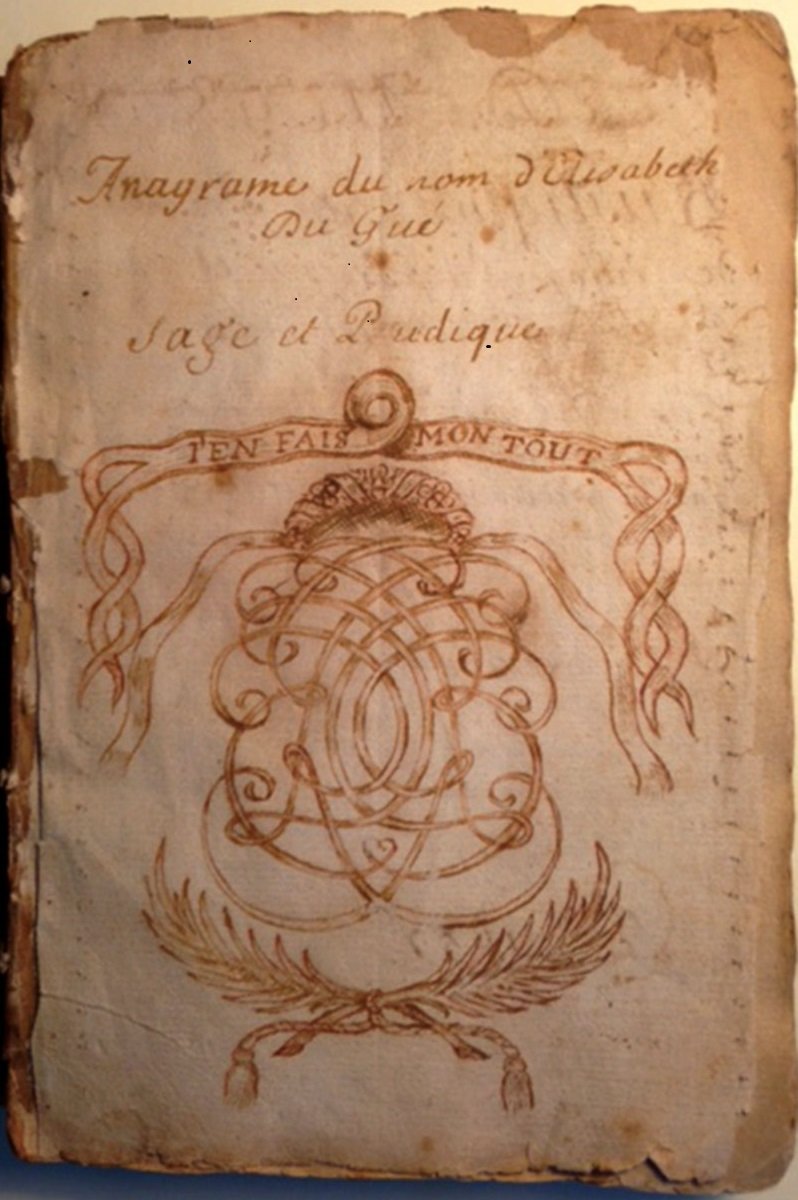Anagrams
The library of the Huguenot Society of South Carolina has some interesting and unusual treasures. One of our favorites is a small book, handmade and hand-written with no real cover or title page.
The first page in the volume is inscribed:
Anagram du nom d’Elisabeth Du Gué Sage et Pudique[1]
The anagram of her initials is headed by the words: J’EN FAIS MON TOUT[2]
On the back of this page is the book’s title: DIALOGUES Rustiques, d’un Prestre de Village d’un Berger et d’un Censier et de sa femme. Tres utile pour ceux qui demeurent en pays ou ils n’ont le moyen d’estres Instruit par la predication de la parole de Dieu. Par J: D. M 1657[3]
The whole book appears to have been transcribed by Samuel Du Bourdieu who wrote a two page note to Mlle. Du Gué signed “Waptaw Le 5e Juillet 1705.”
Samuel DuBordieu, sieur of Heullet, of La Goulaire and of La Bachulaye escaped from France with his siblings Elisabeth, Ester and Renée and Mathieu. Du Bourdieu was born in Vitré, Bretagne, France in March 1650, the son of Olivier Du Bourdieu and his second wife Marie Genne. Samuel Du Bourdieu married Rachel Le Moyne (c. Mar 1654 – 1 Jan 1683) in 1681. Their son, Pierre, baptized in September, 1682, probably died young since no further mention of him was found. The Du Bourdieu estates, their house in Vitré and land in the parishes of Baluzé, Saint-Aubin-des-Landes and Pocé were confiscated and given to Samuel’s brother Pierre, sieur du Bourdieu, described as an “ancien catholique, who remained in France and brought up his sister Elisabeth’s three youngest children..”[4]
Samuel Du Bourdieu is believed to have arrived in Carolina in 1686 and he received denization 9 Apr 1687. Du Bourdieu married second Louise Thoury who was from Sion (south of Rennes), believed to be the daughter of Pierre Thourie, a knife-maker, and his wife Jeanne Onfray. Louise abjured on the isle of Jersey 13 Mar 1686. Also on Jersey at that time was Ester LeCert, from Rennes and later the wife of Jean Guibal of French Santee, and René Ravenel from Vitré. Thoury was described as “a poor girl who has spent all her savings for her passage.” Later in London, she was identified as a house servant and received a grant of £1.10 and clothes from the Royal Bounty distributed by the French Church of London (Threadneedle Street). The marriage date for Thoury and Du Bourdieu is not known, but probably took place after their arrival in Carolina, possibly the result of a shipboard romance. Louise Thoury probably died c. 1689, leaving one son Louis Philippe who was born in Carolina. The only reference to him was found on the 1697 Liste, but he was left £15 sterling by his mother. [5]
The Liste also provides the name of Samuel Du Bourdieu’s second wife, Judith DuGué, born in 1650 to Jacques Du Gué and Judith Soumin. The Du Bourdieu–Du Gué marriage agreement was dated 10 Sept 1690 and was proved 15 Sept 1693. By 1697 when the Liste was made, they had a son, named for his father, and were probably living in Charles Towne.[6]
Elizabeth Du Gué was born in Besance, Berry, France, a daughter of Jacques Du Gué and Elizabeth Dupuy. She and her siblings Isaac, Jacques, Judith, Marie and Pierre arrived in Carolina in 1685 with their father Jacques whose second wife Elisabeth Dupuy is said to have arrived later. Elizabeth Du Gué married Paul Trapier after 1705, possibly c. 1715.
[1] Anagram of the name of Elisabeth Du Gué Wise and Chaste.
[2] I do my best.
[3] Moncy, Jean de, Rural Dialogues, of a Village Priest, a Shepherd, a Census-taker and his wife. Very useful for those who are living in countries where they do not have the means of being instructed by preaching of the word of God.
[4] Le Dour and Le Clech, Les Huguenots Bretons I: 636; Baird, Huguenot Emigration II: 86.
[5] Quarto 18: 185; Le Dour and Le Clech, Les Huguenots Bretons I: 90, 635-6 #93, Baird, Huguenot Emigration II: 85-6; Van Ruymbeke, Eden 62, 70, 83, 89-90; Liste #57. The second marriage of Samuel Du Bourdieu probably took place in September, 1690, placing the approximate date for the death of Louise Thoury sometime during the previous year.
[6] Liste #57; Baird, Huguenot Emigration II: 85-6; Van Ruymbeke, Eden


